I just tested Google vs ChatGPT search — and I’m shocked by the results
I may never Google anything again
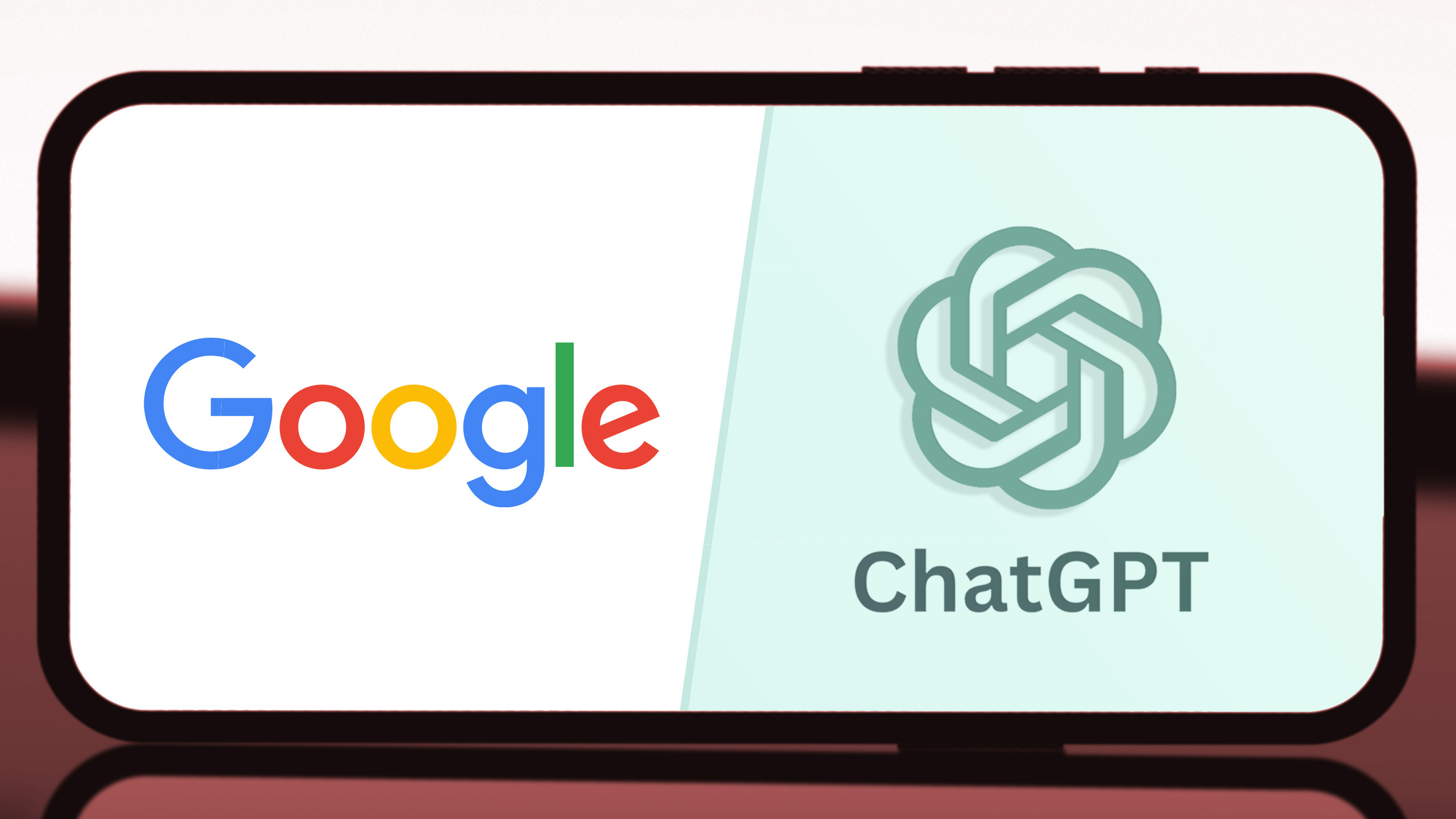
Here at Tom’s Guide our expert editors are committed to bringing you the best news, reviews and guides to help you stay informed and ahead of the curve!
You are now subscribed
Your newsletter sign-up was successful
Want to add more newsletters?

Daily (Mon-Sun)
Tom's Guide Daily
Sign up to get the latest updates on all of your favorite content! From cutting-edge tech news and the hottest streaming buzz to unbeatable deals on the best products and in-depth reviews, we’ve got you covered.

Weekly on Thursday
Tom's AI Guide
Be AI savvy with your weekly newsletter summing up all the biggest AI news you need to know. Plus, analysis from our AI editor and tips on how to use the latest AI tools!

Weekly on Friday
Tom's iGuide
Unlock the vast world of Apple news straight to your inbox. With coverage on everything from exciting product launches to essential software updates, this is your go-to source for the latest updates on all the best Apple content.

Weekly on Monday
Tom's Streaming Guide
Our weekly newsletter is expertly crafted to immerse you in the world of streaming. Stay updated on the latest releases and our top recommendations across your favorite streaming platforms.
Join the club
Get full access to premium articles, exclusive features and a growing list of member rewards.
With OpenAI’s new real-time search feature, ChatGPT is positioning itself as a competitor to traditional search engines like Google. Known for its conversational responses, ChatGPT delivers real-time, contextual information without ads.
I jumped at the chance to see how ChatGPT Search stacks up against Google’s long-standing expertise in search. I ran several comparisons between ChatGPT’s new feature and Google, covering categories like speed, accuracy, visuals, and overall user experience. Here’s how they performed.
1. Speed and response time
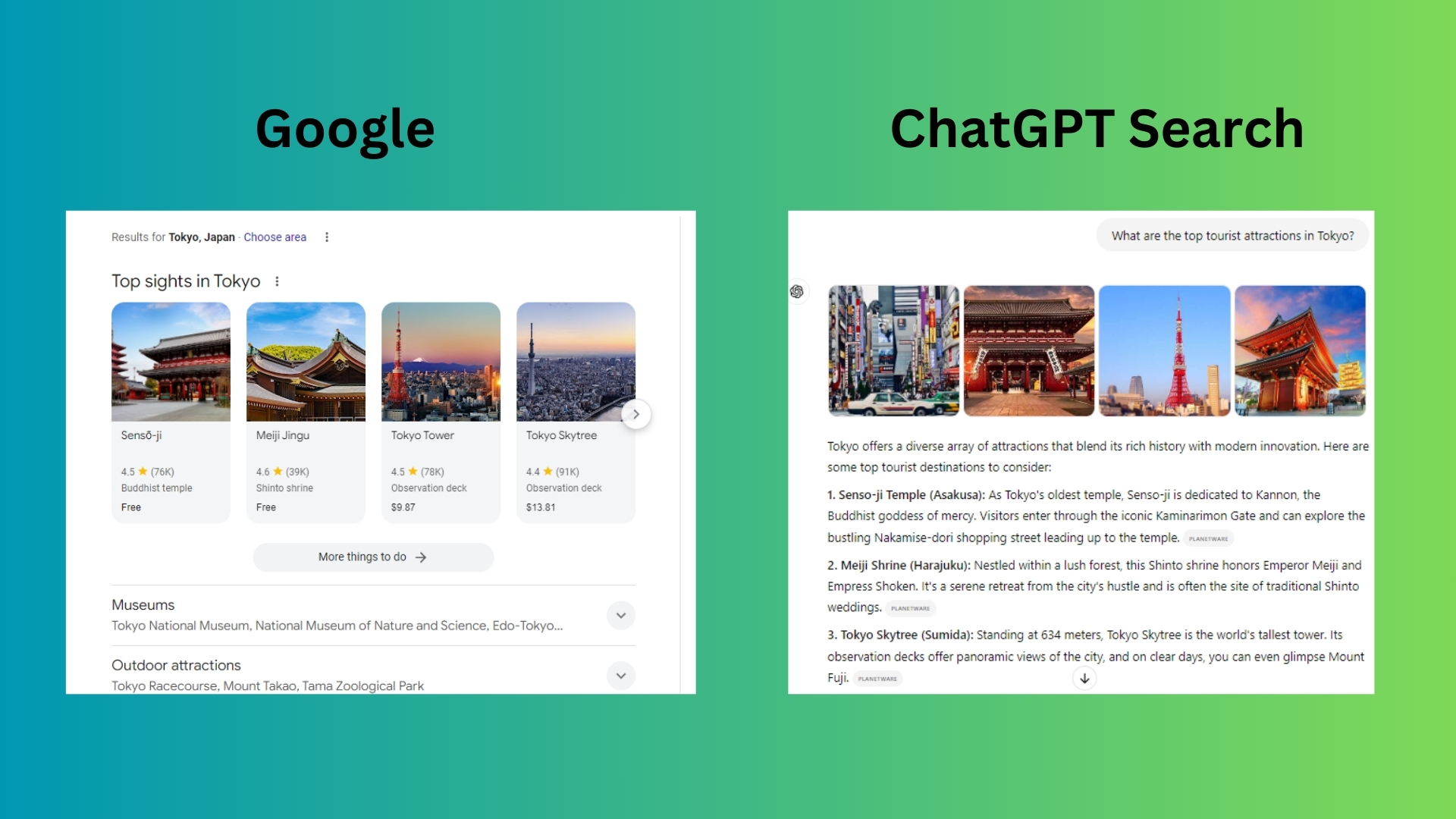
Prompt: “What are the top tourist attractions in Tokyo?”
Google: Google’s search engine is very quick and the results are delivered within milliseconds. With images and links for context, the search engine has years of optimization in its corner, and an infrastructure built specifically for high-speed indexing and retrieval. With this prompt and others, I received instant access to a wide range of relevant results across multiple sources.
ChatGPT: ChatGPT’s search was equally fast and generated images and information for each location in a much clearer, user-friendly way. It was apparent the AI generated the response by pulling from relevant sources and then shared the information in a conversational answer. The results felt friendlier, almost as if the AI is excited for me to take a trip.
Winner: ChatGPT Search takes the lead for a valuable, speedy response delivered in a conversational, yet concise way.
2. Quality of information and accuracy
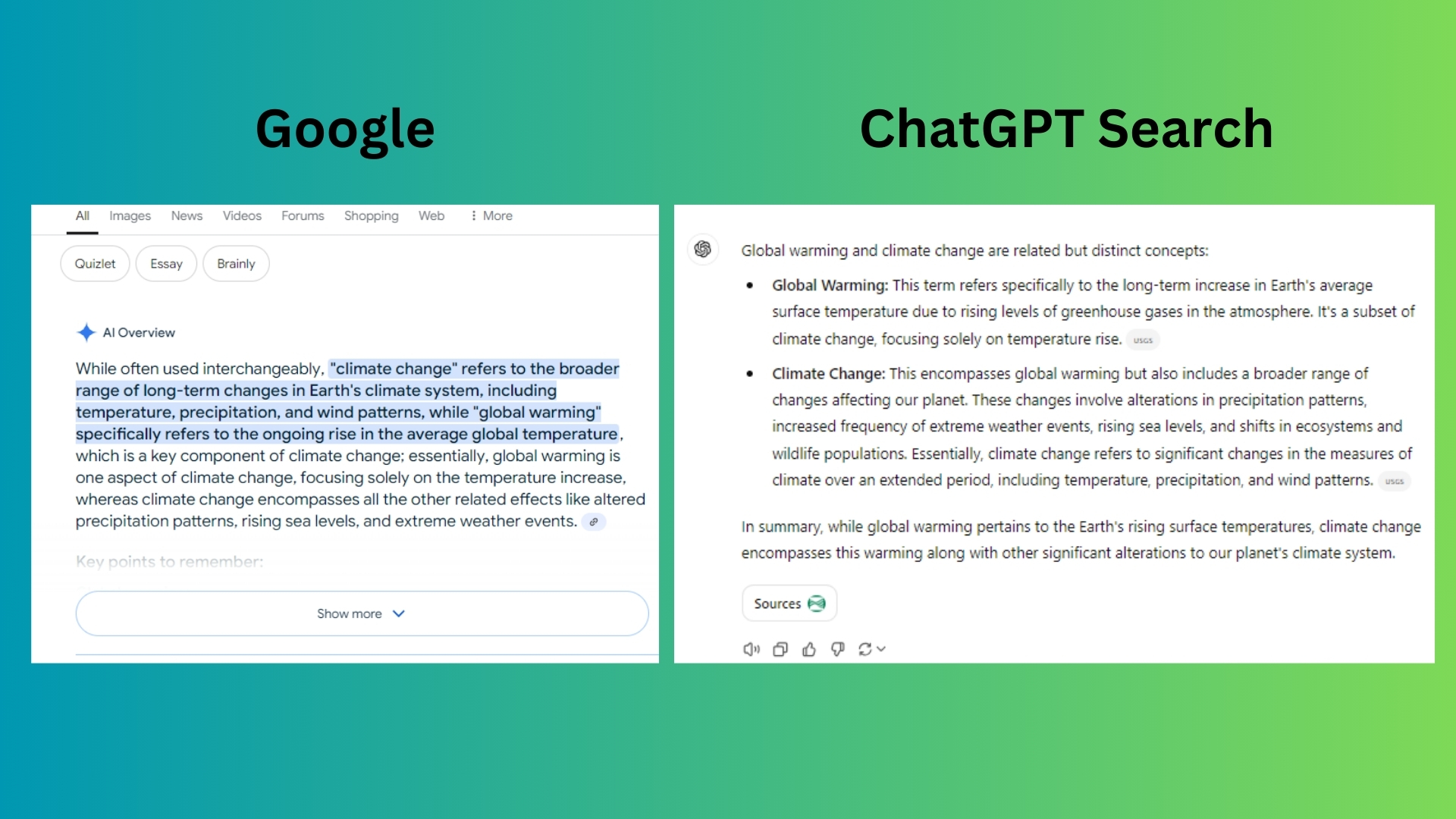
Prompt: “Explain the differences between climate change and global warming.”
Google: Google’s response came from Gemini with an overview of both climate change and global warming wrapped into one short paragraph. From there, I could scroll down and search through a few links from NASA, USGS.gov, and even Quora. It is clear the algorithm prioritizes popular and authoritative sources, but it’s also ad-driven, meaning that the top results sometimes include sponsored content like the one I saw from Unilever. Additionally, with complex topics, I found myself navigating multiple links to piece together a full answer.
ChatGPT: ChatGPT provides a direct answer, pulling verified information from the web, and then adds a clickable “Sources” icon. This feature cuts down on the time I’d spend gathering information from multiple sites within the Google search. With this search and others, ChatGPT’s summaries were on-point for general queries and even more detailed topics, and its design allows for a cleaner, focused experience. (Keep in mind, though, that ads could come in the future.)
Winner: ChatGPT Search wins this round for its directanswers that are convenient and precise.
3. Real-time updates
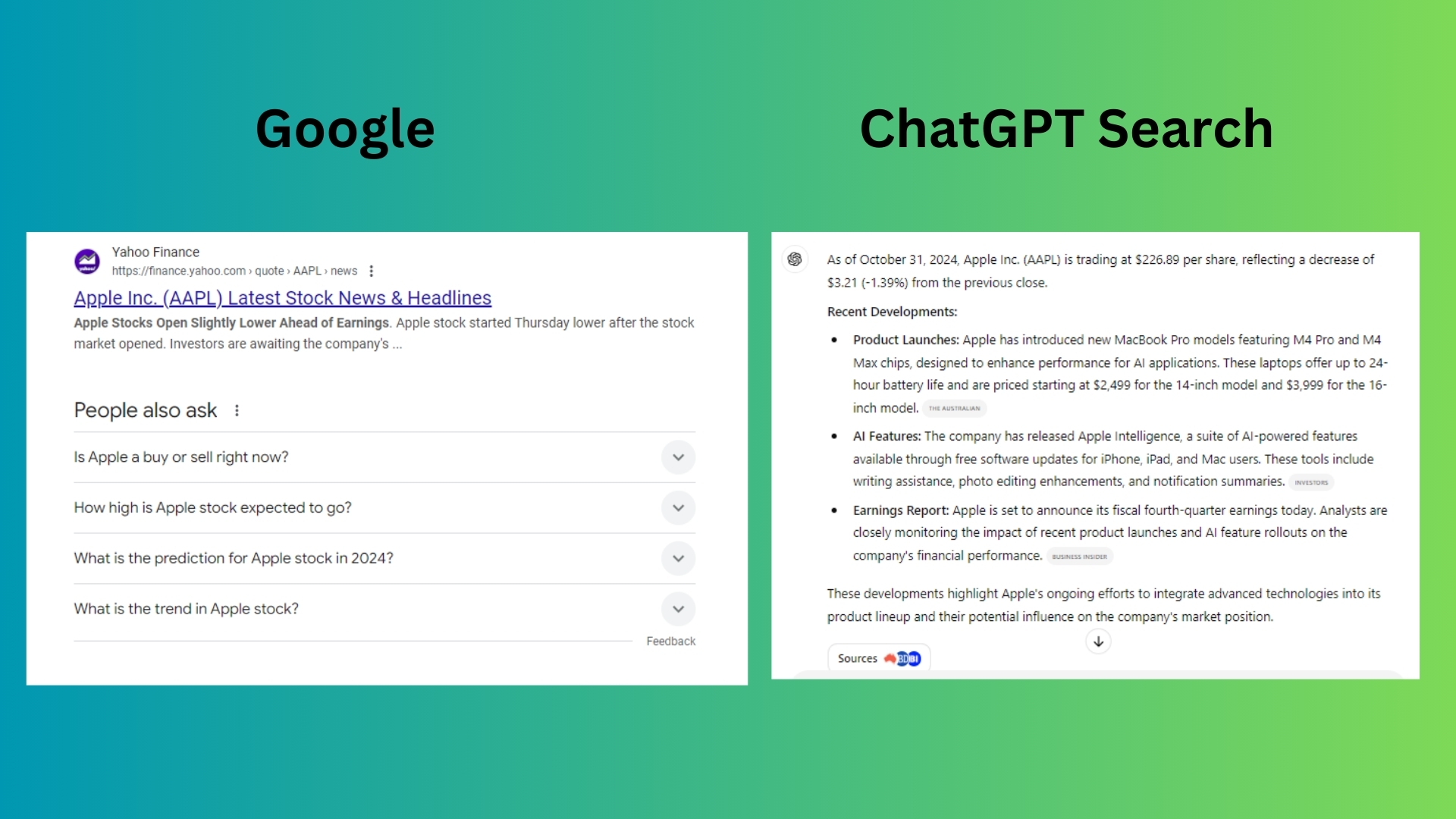
Prompt: What is Apple’s current stock price, and are there any recent news updates?
Get instant access to breaking news, the hottest reviews, great deals and helpful tips.
Google: Google didn’t actually give me an immediate answer. Instead, I got a link to Yahoo Finance where I could click around and hopefully find the answer myself.
ChatGPT: In milliseconds the answer was in front of my eyes. I also got news and updates about Apple with, of course, sources. ChatGPT Search is so refreshing. I’m getting answers to questions without digging around for details. I’m saving time by having the answer presented right before me without clicking a few more times. It is clear that for real-time stock or weather updates, ChatGPT offers comparable accuracy and even more depth despite Google’s vast database of visuals.
Winner: ChatGPT continues to impresses with its curated, real-time direct answers, showing promise for future updates.
4. Privacy and content responsibility
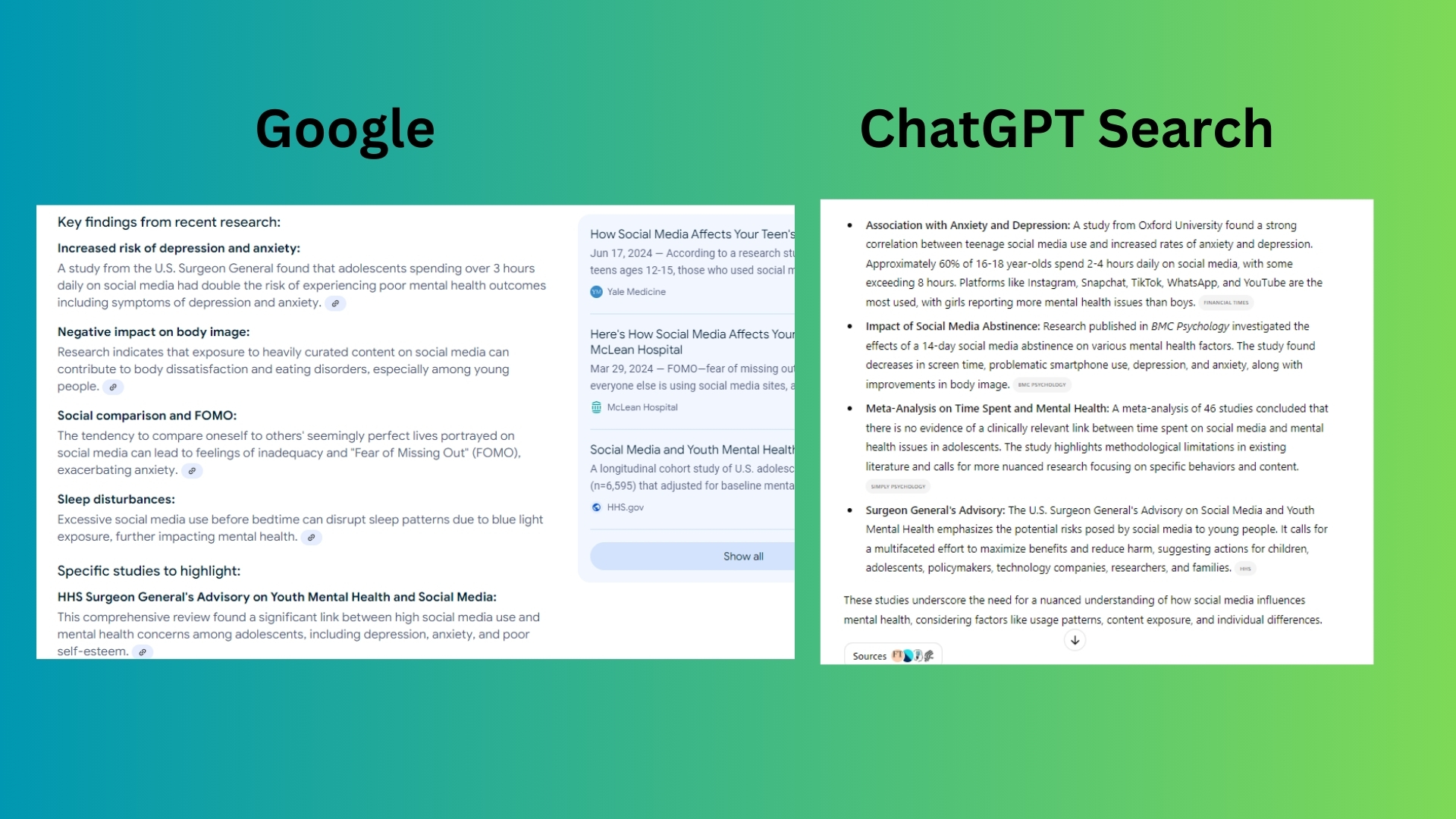
Prompt: Show me recent studies on mental health impacts of social media.
Google: Google offers so many different answers I’m not even sure where to look. From the Gemini response to the side bar to the link results below, the whole experience is extremely cluttered –something I’ve never noticed before using ChatGPT Search. Also, Google’s advertising model means user data is often leveraged to deliver personalized ads. While Google has extensive privacy policies and settings, its ad-driven approach can lead to targeted content that may not always prioritize user privacy.
ChatGPT: Wow. Once again ChatGPT search provides a cleaner interface without promoted content. For searches this personal, the extra privacy-focused approach is much appreciated. It is far more appealing to me as a user who wants information without being targeted by ads during the search — or after.
Winner: ChatGPT leads for an approach that takes privacy and responsible content use into account. When it comes to sensitive searches, not being targeted with ads is a huge bonus.
5. Overall user experience and accessibility
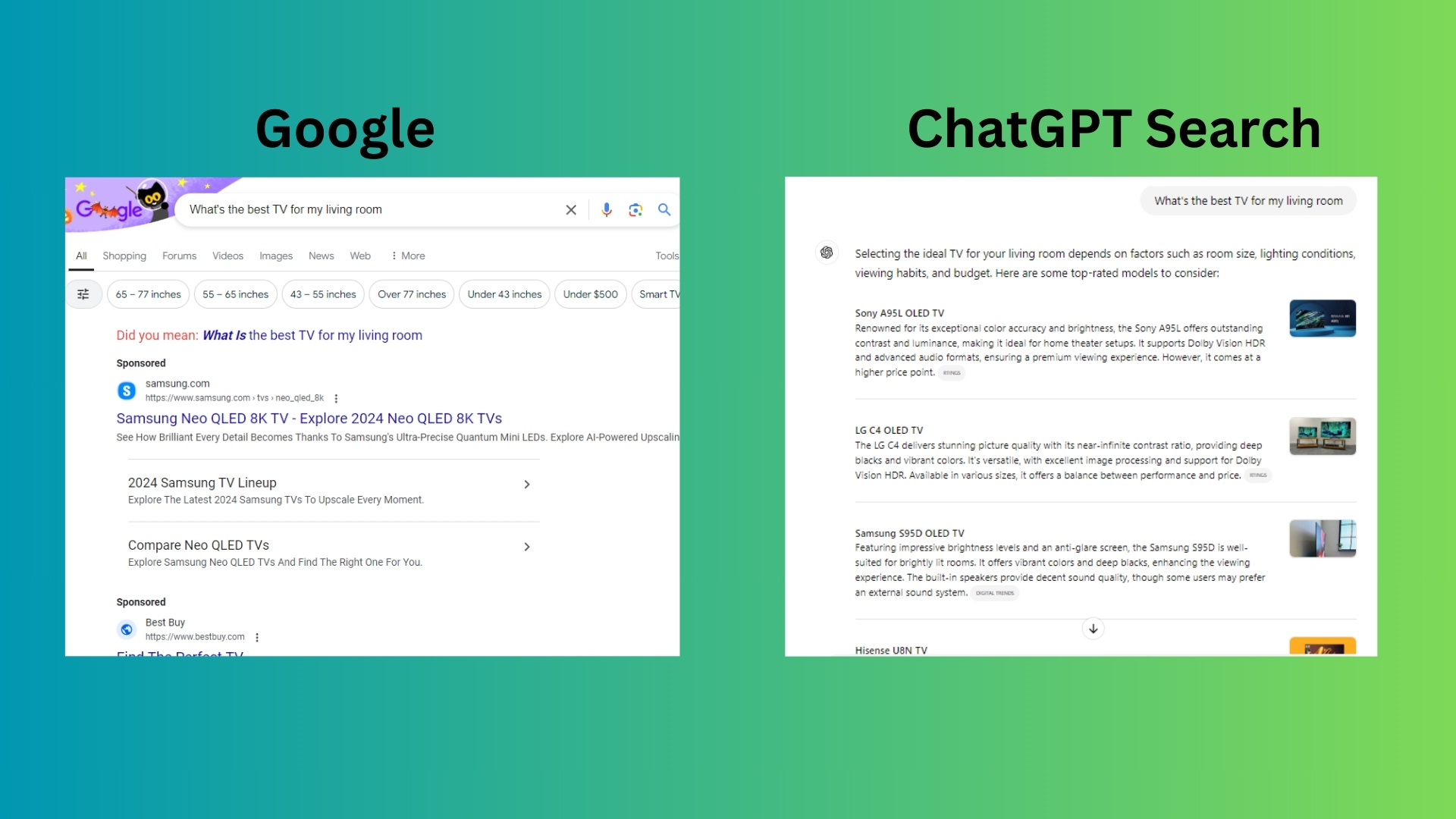
Prompt: What is the best TV for my living room?
Google: I said what I said, Google. After correcting me for typing "What's" instead of "What is" Google responded with a few links, all of which were sponsored, for me to click through and find a TV. After getting this response, I feel as though I need to ask it again to help narrow it down. However, beneath the sponsored links there were links for content publishers like Tom's Guide for its best TVs page.
ChatGPT: ChatGPT Search narrowed it down for me, included images, and gave me the answer I wanted. The AI really does feel like a friend offering up valuable information. Accompanying each TV image was a blurb offering information about each one. The design feels much cleaner and concise compared to Google. Plus, the conversational format is intuitive, so I can scroll through the recommendations without needing to dig through multiple links like I would need to do with a Google search.
Winner: ChatGPT offers a refreshing experience with direct answers and specific examples.
6. News stories in real-time
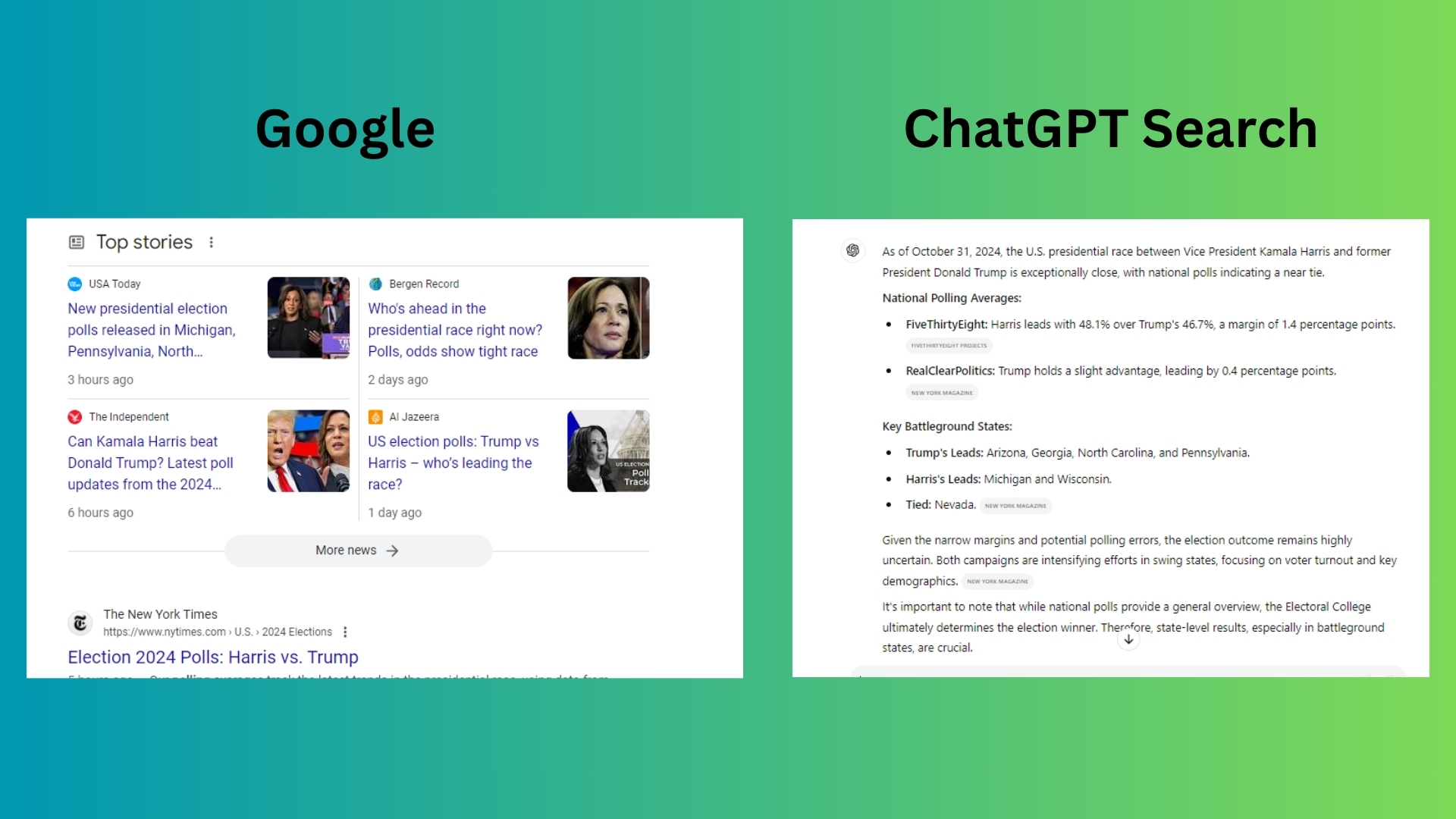
Prompt: Who is leading in the polls?
Google: The results from Google included news stories about the election. My hope with this question was to get no-nonsense, real-time results about who is leading today in the Presidential election polls. I would have had to dig through the news stories to get the answer.
ChatGPT: ChatGPT Search gave me the results exactly how I wanted them with just the facts. The election news is everywhere so I didn't need to read more news stories. ChatGPT gave me a direct answer.
Winner: ChatGPT offers real-time answers without fuss.
7. Sports news and updates
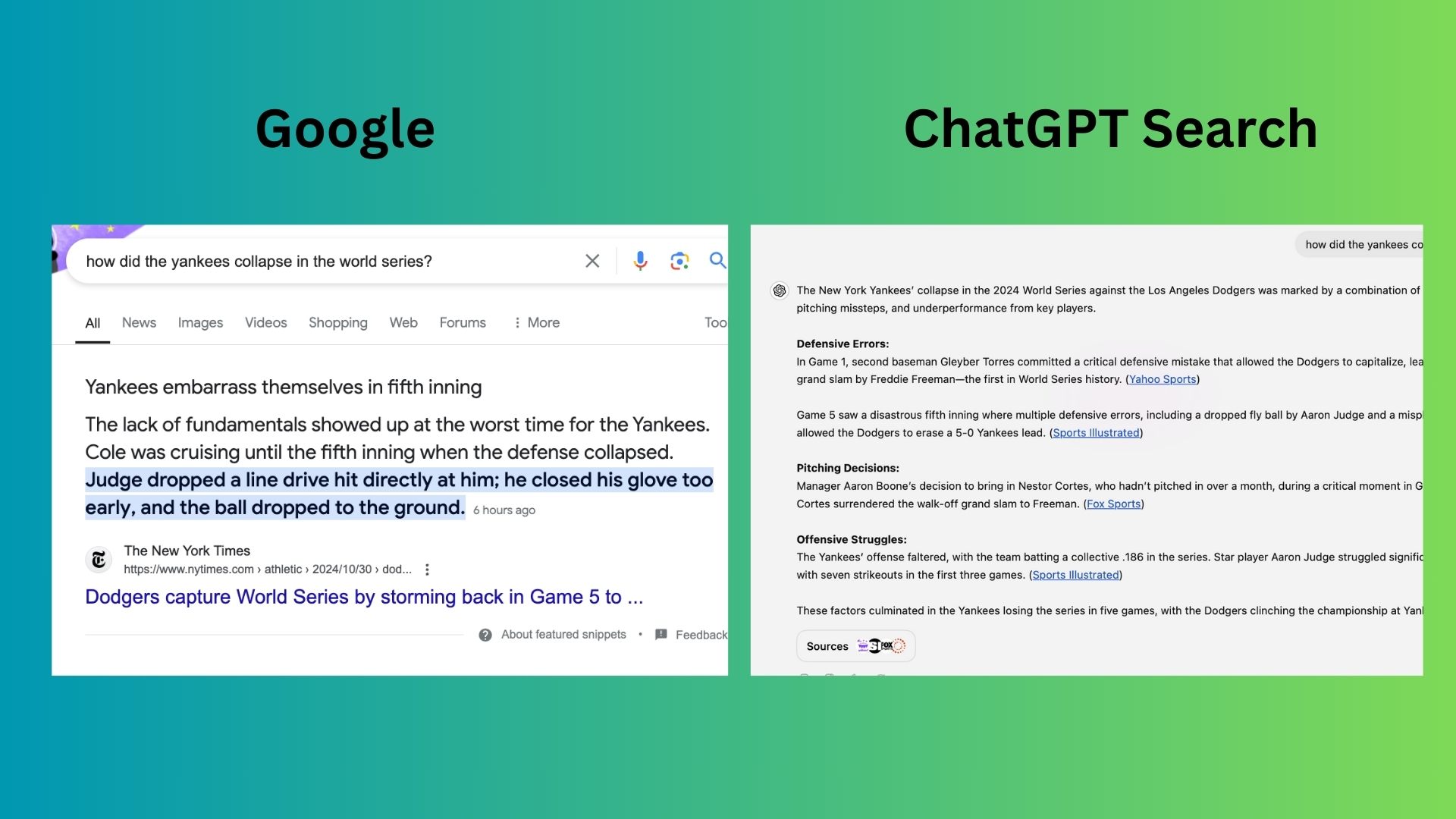
Prompt: How did the Yankees collapse in the World series?
Google: The first result from Google was a quote pulled from a New York Times story on the topic. This was a quick response and direct answer. Yet, it left me feeling like I didn't have the whole story.
ChatGPT: ChatGPT Search gave a more thorough response with information pulled from more sources, yet still felt clean and concise. I got the complete picture of the Yanks' utter failure.
Winner: ChatGPT again, offers real-time answers that I'm looking for plus adds the thoroughness that confirms I'm getting all the information.
Overall winner: ChatGPT Search
Both ChatGPT and Google excel in different areas, but they cater to slightly different needs. If you’re looking for comprehensive search results with a vast array of sources and visuals, Google is still the powerhouse. However, if your priority is clear, ad-free, conversational responses with built-in real-time updates, ChatGPT offers a streamlined, user-friendly experience that could easily become a staple for everyday queries.
The clutter-free answers from ChatGPT Search with sources to back them up are thorough and reliable. I feel more confident in the ChatGPT answers because they are so concise and without advertisers backing them. The results feel as though the results are just for me. In a cluttered web, ChatGPT feels like a helpful friend, and I like that.
More from Tom's Guides
- Claude AI expands with desktop apps — here’s what's new
- ChatGPT Advanced Voice is now on Mac and Windows — how to get access
- Look out, Google — Meta AI is reportedly developing its own search engine

Amanda Caswell is an award-winning journalist, bestselling YA author, and one of today’s leading voices in AI and technology. A celebrated contributor to various news outlets, her sharp insights and relatable storytelling have earned her a loyal readership. Amanda’s work has been recognized with prestigious honors, including outstanding contribution to media.
Known for her ability to bring clarity to even the most complex topics, Amanda seamlessly blends innovation and creativity, inspiring readers to embrace the power of AI and emerging technologies. As a certified prompt engineer, she continues to push the boundaries of how humans and AI can work together.
Beyond her journalism career, Amanda is a long-distance runner and mom of three. She lives in New Jersey.
 Club Benefits
Club Benefits




















